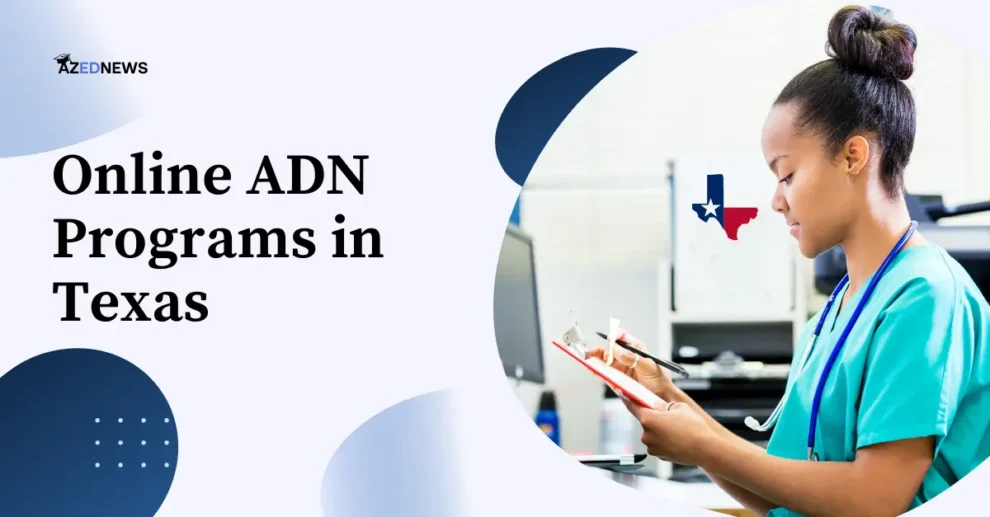With their busy schedules, students are increasingly choosing to pursue higher education through flexible and convenient Online ADN Programs in Texas. Since Texas is a member of the Nurse Licensure Compact (NLC), which makes it easier for registered nurses to obtain multi-state licenses to practice in other compact states, obtaining a nursing degree here can also be advantageous for individuals who wish to work abroad.
Table of Contents
The US healthcare system was under pressure from decades of nursing shortages, and the coronavirus epidemic drove healthcare professionals to their limits. The need for nurses is greater than it has ever been, particularly in one of the biggest states in the union. In Texas, ten percent of the nation’s community hospitals which account for more than 500 facilities providing care to patients throughout the state are located.
In this blog, we have given a detailed list of the Online ADN Programs in Texas which could help aspiring students to pave a path in this field of career.
Key Takeaways:
- In Texas, ten percent of the nation’s community hospitals which account for more than 500 facilities providing care to patients throughout the state are located.
- The Texas Board of Nursing is responsible for certification, license requirements, and continuing education for nurses.
- Applicants must pass the National Council Licensure Examination (NCLEX) or get an endorsement from another state to be eligible to practice nursing in Texas.
- Some of the best online adn programs in Texas are the University of Texas at Arlington, the University of Texas at Tyler, Texas A&M University, Texas Women’s University, and more.
- In Texas, online nursing programs are completed in two to four years.
- Top Texas institutions offer online courses that range in price from $200 to $1,000 per credit.
- Any degree format, including online or on-campus, will guarantee that students have the foundation they need to be successful in the industry if they graduate from a recognized program.
How to become a nurse in Texas?
Controlling the state’s nursing workforce, the Texas Board of Nursing (BON) is in charge of license requirements, certification, and continuing education for licensed professionals.
Licensed vocational nurses (LVNs), registered nurses (RNs), advanced practice registered nurses (APRNs), and certified nursing assistants (CNAs) are among the various nursing specialties recognized in Texas.
Applicants must pass the National Council Licensure Examination (NCLEX) or get an endorsement from another state to be eligible to practice nursing in Texas. Online courses and programs offered by out-of-state nursing education providers are not approved by the Texas Board of Nursing.
Though an applicant’s education may have been completed outside of Texas, the BON does accept nursing schools authorized by other state boards, which may grant eligibility to take the NCLEX in Texas.
There are many job options for graduates of online nursing schools since the demand for nurses in Texas is expected to increase in every category over the next ten years.
What is the eligibility of enrolling in an Online ADN Programs in Texas?
The requirements for Texas online nursing programs can change based on the school you select and the particular program you are interested in. Some, nevertheless, are shared by numerous programs.
1. License for Registered Nurses (RNs):
ADN holders and nursing diploma holders who are registered nurses pursuing a BSN are well-served by a large number of online nursing programs. Thus, in most cases, enrollment requires a current, valid RN license.
2. Qualifications for General Education:
The majority of programs demand general education courses in biology, chemistry, anatomy and physiology, mathematics, and English.
3. GPA minimum:
A minimum GPA of 2.5 to 3.0 is commonly required by schools for admission to their online nursing programs.
4. Test Results:
The results of standardized examinations like the TEAS (Test of Essential Academic Skills) may be required of candidates to certain programs. These exams measure preparation for nursing school as well as fundamental academic skills.
How to become an advanced practice registered nurse in Texas?
Applicants for APRN positions must hold an RN license from Texas or another state that is a member of the Nurse Licensure Compact. Additionally, candidates must complete an approved graduate-level APRN educational program, such as a Master of Science in Nursing (MSN) from the Texas Board of Nursing. Lastly, a candidate must hold national certification in the population focus area and job associated with their program.
In addition to completing a minimum of 20 contact hours, prospective APRNs must complete at least 400 hours in an advanced nursing practice job within two years of graduating from college.
Following the fulfillment of these prerequisites, prospective APRNs must complete a minimum of 20 contact hours and at least 400 hours in an advanced nursing practice capacity within two years of graduating from college.
After that, candidates may submit an application and the standard application cost. To get prescriptive authority, APRNs will need to pay a higher application cost.
10 Best Online ADN Programs in Texas:
1. University of Texas at Arlington:

The University of Texas at Arlington’s online program for registered nurses seeking a Bachelor of Science in Nursing (BSN) emphasizes a liberal arts background, research-based nursing science, and nursing leadership principles.
The curriculum will equip practicing nurses with the clinical judgment and management abilities required in the rapidly changing healthcare sector.
- Program Length: As few as nine months
- Tracks/concentrations: None specified
- Estimated Cost: $257 per credit hour
- Required Credits to Graduate: Varies
- Accreditation: Commission on Collegiate Nursing Education (CCNE)
2. University of Texas at Tyler:

Working nurses at the University of Texas at Tyler can complete their BSN program while still working. With the help of the online RN-BSN degree track, which covers crucial nursing topics including nursing leadership, care coordination, and health assessment, students may enhance their nursing careers and have a beneficial impact on the healthcare industry.
- Program Length: As little as 12 months
- Tracks/concentrations: None specified
- Estimated Cost: $9,895 (total cost)
- Required Credits to Graduate: 30 hours
- Accreditation: Commission on Collegiate Nursing Education (CCNE)
3. University of Mary Hardin-Baylor:
For registered nurses who are currently employed, the University of Mary Hardin-Baylor provides an online Bachelor of Science program.
The 30-credit program offers flexibility, individualized support from success coaches and instructors, and the freedom to learn at their own pace and demonstrate competency through examinations.
- Program Length: As few as 10 months
- Tracks/concentrations: None specified
- Estimated Cost: $500 per credit hour
- Required Credits to Graduate: 30 credit hours
- Accreditation: Commission on Collegiate Nursing Education (CCNE)
4. Texas A&M University:

The Texas A&M University online RN-to-BSN program enables registered nurses with an associate degree in nursing to obtain a Bachelor of Science in Nursing. All of the program’s 30 credit hours are offered online, and students must do practicums in local communities.
Depending on their entering term, applicants can finish the program in three or four semesters. They must also possess an unencumbered RN license and fulfill particular prerequisite academic requirements.
- Program Length: One to two years
- Tracks/concentrations: None specified
- Estimated Cost: $1,530 per credit hour (in-state rate), $5,268 per credit hour (out-of-state rate)
- Required Credits to Graduate: 30 credit hours
- Accreditation: Commission on Collegiate Nursing Education (CCNE)
5. Texas Women’s University:

The Texas Woman’s University online RN-BSN program is intended for registered nurses who want to progress in their careers and gives working adults the flexibility to attend classes while holding a full-time job.
The curriculum consists of seven-week courses with capstone and in-class projects that include clinical components.
- Program Length: Two to three semesters
- Tracks/concentrations: None specified
- Estimated Cost: $238 per credit hour
- Required Credits to Graduate: 60 semester credit hours
- Accreditation: Commission on Collegiate Nursing Education (CCNE)
6. Texas Tech University:

Registered nurses with associate degrees who wish to pursue a bachelor’s degree can enroll in Texas Tech University’s RN to BSN program. This curriculum lasts only two or three semesters and is delivered online.
The program incorporates individual practicum experiences in students’ local communities while emphasizing evidence-based methods, critical thinking, and holistic care.
- Program Length: Two to three semesters
- Tracks/concentrations: None specified
- Estimated Cost: $915 per credit (in-state rate), $1,335 per credit (out-of-state rate)
- Required Credits to Graduate: 30 semester credit hours
- Accreditation: Commission on Collegiate Nursing Education (CCNE)
7. West Texas A&M University:

Working nurses can enroll in the West Texas A&M University RN to BSN program, regardless of their location, as it offers a fully online learning environment. Although the curriculum incorporates practicum case studies and experiences, attendance on campus is not mandatory.
- Program Length: One to two years
- Tracks/concentrations: None specified
- Estimated Cost: $8,500 (total program cost)
- Required Credits to Graduate: 131 – 133 hours
- Accreditation: Commission on Collegiate Nursing Education (CCNE)
8. Midwestern State University:

The RN to BSN program at Midwestern State University is designed to help registered nurses balance their employment obligations while completing their degree in three semesters.
It is offered in a streamlined online format. With the individualized coaching and supervision of committed faculty members, this 27-credit program helps students get ready for leadership positions.
- Program Length: As few as three semesters
- Tracks/concentrations: None specified
- Estimated Cost: $326 per credit (resident rate), $391 per credit (non-resident rate)
- Required Credits to Graduate: 27 credit hours
- Accreditation: Commission on Collegiate Nursing Education (CCNE)
9. University of Texas at El Paso:

The online RN to BSN program at the University of Texas at El Paso has a 100% online format with flexible scheduling. The program, designed especially for working professionals by UTEP’s College of Nursing, enables students to take courses one at a time and advance at their own speed.
- Program Length: As few as 12 months
- Tracks/concentrations: None specified
- Estimated Cost: $336 per credit
- Required Credits to Graduate: 120 hours
- Accreditation: Commission on Collegiate Nursing Education (CCNE)
10. Lamar University:

Lamar University’s online RN to BSN program, located in Beaumont, can be completed in as little as 13 months. The Joanne Dishman School of Nursing is responsible for delivering the program, which includes extensive themes such as evidence-based practice, leadership, and community nursing.
Under the direction of knowledgeable teachers, students participate in online learning activities and real-world experiences.
- Program Length: 13 months
- Tracks/concentrations: None specified
- Estimated Cost: $578 per credit (resident rate), $998 per credit (non-resident rate)
- Required Credits to Graduate: 120 hours
- Accreditation: Commission on Collegiate Nursing Education (CCNE)
How much time does it take to finish an online nursing program in Texas?
In Texas, online nursing programs are completed in two to four years. Completing an associate degree in nursing (ADN) program, which takes roughly two years, is the quickest route. A BSN program, on the other hand, requires four years to finish.
Bachelor’s degree holders make up about 43% of nurses. However, as the figure below demonstrates, associate degrees are also a popular option.
It may take a few extra months for graduates of either program to obtain their registered nurse (RN) license after passing the NCLEX-RN exam.
What are the differences between an on-campus and online nursing program?
Take your learning style into account when contrasting on-campus and online nursing schools. Online courses accommodate remote learners and those with professional or personal obligations by providing flexible scheduling and the option to work from any location.
Online learning, however, necessitates self-control and could restrict networking and communication with teachers and fellow students.
Conversely, programs offered on campus provide an organized learning atmosphere. Through interactive laboratories and integrated clinical rotations, you can anticipate frequent face-to-face interactions with peers and professors.
This structure has set timetables and requires in-person participation, but it also offers excellent possibilities and assistance.
Students can also apply for nursing schools that don’t require a TEAS test in Texas to get admitted into a college for offline classes.
What is the average cost of an online adm program in Texas?
Top Texas institutions offer online courses that range in price from $200 to $1,000 per credit. These programs have credit requirements ranging from 30 to 133 credits.
Many nursing schools, whether in-state or out-of-state, have a single tuition fee for online students, similar to the best business schools in Texas.
The degree type you select will determine the cost. While bachelor’s degrees offer a more thorough education, they usually come with higher time and cost requirements. On the other hand, associate programs are frequently less expensive and can be finished more quickly.
The cost of tuition varies depending on the school’s status as public or private, with private institutions charging higher fees.
Which classes are usually included in an online nursing curriculum?
Texas offers online nursing programs that cover a wide range of topics, including evidence-based nursing, community health, healthcare leadership, and advanced nursing practices. Students study how technology is transforming healthcare as the world gets more digital.
Although course titles and contents may differ significantly throughout programs, the majority of online RN to BSN programs have a common curriculum that includes courses in:
- Nursing Theory and Practice
- Professional Nursing Ethics and Legal Issues
- Health Assessment
- Pathophysiology
- Pharmacology
- Communication and Collaboration in Healthcare
The majority of online nursing programs contain in-person training components, particularly those that prepare students for licensure like LPN or BSN. Online learners do not have to move to meet this need, though. Rather, nursing programs assist students in locating clinical sites close to their residences or places of employment.
How to choose the best Online ADN Programs in Texas?
The accreditation status of online nursing schools in Texas is an important factor to take into account. The program satisfies the highest requirements of academic excellence if it has accreditation from an accredited body such as the Accreditation Commission for Education in Nursing (ACEN) or the Commission on Collegiate Nursing Education (CCNE).
Since only recognized or board-approved schools meet state standards for licensure, accreditation is a crucial consideration for applicants seeking licenses.
Next, think about your timetable and learning preferences. Online courses come in a variety of forms, such as synchronous lectures with live interaction, asynchronous assignments that you can finish at your own speed, or a combination of the two. Pick a course of study that complements your learning style and lets you arrange classes around your current job or family obligations.
Lastly, become familiar with the way online clinical encounters are conducted. Seek initiatives that have forged alliances with local medical facilities.
What are the job opportunities after the online adn program in Texas?
There is a huge and increasing need for all kinds of nurses in Texas. The need for registered nurses alone will lead to 16,210 openings annually until 2030, according to data from the U.S. Bureau of Labor Statistics (BLS), with thousands more openings for other nursing roles.
The anticipated job growth rates and job opportunities for Texas nurses over the next ten years are shown in the table below. Although individuals with traditional on-campus degrees may initially be preferred by some healthcare organizations, this trend is gradually changing.
Accredited online nursing programs are valued by many businesses. The growing acceptability of online degrees will coincide with advancements in education technology.
In the end, when assessing nurses, employers are mostly concerned with abilities, expertise, and real-world experience. Any degree format, including online or on-campus, will guarantee that you have the foundation you need to be successful in the industry if you graduate from a recognized program.
| Role | Projected Job Growth (2020-2030) | Average Annual Openings (2020-2030) |
| Licensed Practical and Licensed Vocational Nurses | 16.7% | 6,870 |
| Nurse Anesthetists | 24.6% | 250 |
| Nurse Practitioners | 66% | 2,010 |
| Nursing Assistants | 14.6% | 10,940 |
| Registered Nurses | 17.1% | 16,210 |
Frequently Asked Questions
1. Can you become an RN online in Texas?
Texas students can discover an online or hybrid nursing degree that meets their needs because numerous colleges offer distance learning programs. Although these two-degree options include online courses, they both demand that nursing students complete clinical hours at a hospital or other appropriate healthcare facility in person.
2. How long is the ADN program in Texas?
Community colleges and hospital-based nursing schools provide the two-year Associate Degree in Nursing (ADN), which trains students for a specific technical scope of practice.
3. What is the fastest way to become an RN in Texas?
The Certified Nurse Aide (CNA) Certificate is the quickest path to becoming a nurse. Typically, Certified Nurse Aides work in an entry-level capacity to advance their schooling to become Registered Nurses or Vocational Nurses.
4. How much does ADN make in Texas?
In Texas, an advanced practice nurse makes, on average, $38.89 per hour.
5. How much time does it take an ADN to become an RN?
The quickest route to becoming a registered nurse is often to earn an ADN. Generally speaking, these programs are less expensive and time-consuming than conventional BSN programs. ADN programs are two years long and emphasize the use of clinical skills.
Conclusion:
Access to quick, inexpensive, and high-quality education is essential to bringing in new nurses as the need for nurses grows. Through associate nursing degree (ADN) programs, community and junior colleges in Texas are assisting in meeting this need by preparing students to become registered nurses (RNs) in as little as two years.
There are numerous ADN programs in Texas, ranging from Houston to El Paso. Many of these colleges also provide online coursework in addition to in-person clinical training, acknowledging the times they live in.












Add Comment